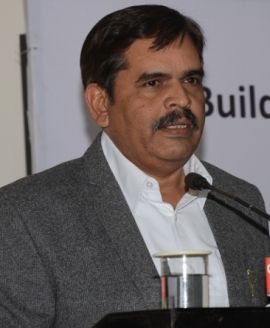'Everybody was ready to agree with the government if the process to acquire land was a judicious one. All of us want industrialisation and development of the country.'
'The Congress has no moral right to say that the government is pro-corporate. What were they when they were ruling? We did not say that the government is working for the private sector or any individual. What we said was, the process of land acquisition should be judicious, justifiable and good.'

From the time the Narendra Modi government started pushing the Land Acquisition Bill, the Swadeshi Jagran Manch has openly expressed its concerns. The SJM was the first to express its opposition with certain elements in the bill.
After the series of talks it had with the government, the SJM said the bill contains several 'detestable and unacceptable situations.' Once its members deposed before the Joint Parliamentary Committee, the SJM was hopeful of a change in the unacceptable clauses in the bill.
Now that the Modi government has decided not to push those issues, the SJM is happy.
'SJM thanks you for accepting our concerns in land bill,' Dr Ashwani Mahajan, co-founder of the Swadeshi Jagran Manch, tweeted to the prime minister, Bharatiya Janata Party President Amit Shah and Finance Minister Arun Jaitley.
Dr Mahajan, below, left, discussed the issues with Shobha Warrier/Rediff.com
Now that the government has decided not include to the changes it wanted earlier in the Land Acquistion Bill, are you happy?
Everything seems to be fine now. We had been opposing first the ordinance and then the bill clause by clause. The first voice that came against the new clauses was from the Swadeshi Jagran Manch.
You spoke to us then. Later, when I interviewed Mr S Gurumurthy, he had said the SJM was in talks with the government on the bill.
After the talks, the SJM issued a statement saying the bill contained several 'detestable and unacceptable situations.' What were the 'detestable and unacceptable' clauses?
Right from the very beginning, the Swadeshi Jagran Manch had said the ordinance was not in the right direction. That was because the SJM felt the three conditions which were removed to make land acquisition easier were not good.
The purposes for which the conditions were waived off, were defence, affordable housing and social infrastructure. We were in agreement with the government in the case of defence and we were also of the opinion that for defence, no condition should be imposed.
There is an established international practice that Social Impact Assessment is a must for any project. It is prudent to make an assessment of the kind of impact a project would have on society, the environment and the livelihood of people. When you make an assessment, you will know how much land is required for a project. So, this is a very scientific way of doing a project.
Our opinion was that if the government felt that Social Impact Assessment was taking time, let them make the government machinery more efficient.
Next was, if the government felt that getting consent from 70 per cent of the farmers was difficult, they should go for majority consent. But consent is very essential; you just cannot acquire land without the consent of the farmers.
About food security. We have about 2.5 per cent of the global land where we can cultivate. As far as the population is concerned, we have about 17 per cent of the world population. Over the years, because of industrialisation, land acquisition, land grabbing, etc, our cultivated land is reducing.
You can't build concrete jungles on agricultural land as we can't live without food. More than Rs 70,000 crore (rs 700 billion) is being spent on imports now.
The SJM told them that as a rule, the government should not acquire irrigated land which gives 2, 3 crops.
We told them that no legislation was final and that they could make changes any time, but the basic principles behind it should always be kept in mind.
The entire Opposition opposed the bill. Was the SJM also with the Opposition?
The SJM is not a political party and we have no intention to be one. The situation was such that we had put forward some suggestions and many farmers' organisations also had made their suggestions. Nobody said we did not want progress, rail or industries.
Everybody was ready to agree with the government if the process to acquire land was a judicious one.
Land is very scarce and very important, that is why we wanted the government to come out with a land use policy. You say that industries need land, but they have left so much land vacant.
Land acquisition is not the major hurdle in the development of the country as an RTI reply says only 8 per cent of the projects are stalled due to land acquisition issue.
All of us including the SJM want industrialisation and development of the country.
Did the SJM feel then that the bill was anti-agriculture?
No, we did not question the intention of the government. We did not say that they worked for a particular section of the society, like the Opposition that says the government is pro-corporate.
The Congress has no moral right to say that the government is pro-corporate. What were they when they were ruling? We did not say that the government is working for the private sector or any individual.
What we said was, the process of land acquisition should be judicious, justifiable and good.
Was it a farmer versus industrialist situation?
No, we did not feel that way. But the process the government had adopted had given it that kind of an image. It was the undue hurry of the government that had led to that image.
 In your talks with the government, were they open to your concerns?
In your talks with the government, were they open to your concerns?
Yes, they were. They had felt that certain clauses in the 2013 Act would affect the development and growth of the country. Because they thought like that, they wanted to bring about those major changes.
We raised our concerns, never doubting the intention of the government. We told them that the changes didn't look justified. We opposed them clause by clause.
When the JPC was formed, you expressed your concerns to the JPC too?
All the political parties understood our concerns. The JPC received around 800 plus applications and 51 organisations appeared before the JPC. Out of 51, only two favoured the new bill.
But I want to say again that we should not describe this as our victory or your victory. This was a democratic process and we discussed the issue. It is not that all the people in all political parties know the implications.
The beauty of the whole process was that our democracy is very well developed, and civil society and various organisations are working deeply with issues like these. For example, we were also opposing the Special Economic Zones and acquisition of land in Himachal Pradesh, Odisha and other places.
The 2013 Act was termed as a UPA (United Progressive Alliance) government's Act at that time and even now.
The 2013 Act was not the UPA's Act. In 2013, the bill was passed after 124 years! It took 66 years after Independence to pass the bill.
To create the Act, many minds worked together including that of the BJP. We were also part of it from the beginning and we had made several suggestions to make it better. Some of our concerns were incorporated. It was just that a Congress-led alliance was ruling at that time.
We wanted a land use policy and a balance sheet to show how much land was used and how much land is needed. Our question is: Why should you acquire land? Why don't you take it on lease?
We also suggested that the state governments should have their own laws. And it is expected of various state governments to have their own laws. Land acquisition is a major issue and they should have their own laws.
What happened now is that the government has honoured the people's opinion.
You mean the government was not adamant?
Had the government been adamant, they would not have listened to us at all.
Are you happy now that the government listened to your concerns?
Yes, we are. We asked for something and they are giving us that. But the media is now painting it as the victory of the Opposition and the defeat of the government. They are using terms like U-turn, going back, etc, but I would like to describe this as the victory of the people.
No political party can take credit for this.











 © 2025
© 2025